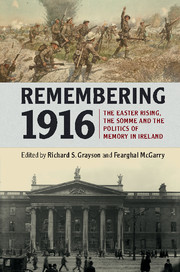Book contents
- Frontmatter
- Contents
- List of figures
- List of tables
- List of contributors
- Introduction
- Part I Memory and commemoration
- Part II Narratives
- 4 Instant history: 1912, 1916, 1918
- 5 Hard service: remembering the Abbey Theatre's rebels
- 6 Beyond the Ulster Division: West Belfast members of the Ulster Volunteer Force and Service in the First World War
- 7 Remembering 1916 in America: the Easter Rising's many faces, 1919–1963
- Part III Literary and material cultures
- Part IV Troubled memories
- Index
7 - Remembering 1916 in America: the Easter Rising's many faces, 1919–1963
from Part II - Narratives
Published online by Cambridge University Press: 05 March 2016
- Frontmatter
- Contents
- List of figures
- List of tables
- List of contributors
- Introduction
- Part I Memory and commemoration
- Part II Narratives
- 4 Instant history: 1912, 1916, 1918
- 5 Hard service: remembering the Abbey Theatre's rebels
- 6 Beyond the Ulster Division: West Belfast members of the Ulster Volunteer Force and Service in the First World War
- 7 Remembering 1916 in America: the Easter Rising's many faces, 1919–1963
- Part III Literary and material cultures
- Part IV Troubled memories
- Index
Summary
The goal of this chapter is to focus some attention on a period that has been relatively neglected by historians of the Irish in America: the years from the end of mass immigration in the 1920s through the early 1960s. How, by whom, and with what effect was the Easter Rising remembered in this period? Providing some answers to these questions may tell us something about a wide range of memory practices, while also shedding light on important aspects of Irish-American life – and American life more generally – in these decades. The argument can be briefly stated: though a once powerful Irish-American republican movement shrank dramatically in this period, the Easter Rising continued to be remembered (in different ways and for different purposes) by figures as varied as ecclesiastical sculptors, Irish-American labour leaders, and African-American nationalists. Remembering 1916 in America involved a diverse array of people, mediums, and motives, and its analysis has the potential to shed light on important mid-twentieth-century topics ranging from African-American political activism to the ethnic diversity within American Catholicism.
The period from the 1920s to the 1960s remains one of the least studied in Irish-American history, and this is one reason for this chapter's temporal focus. The rich body of nineteenth- and early-twentieth-century research suddenly thins out (as evidenced, for example, by the 1921 end date of Kerby Miller's landmark study, Emigrants and Exiles). The situation improves somewhat when we reach the mid-1960s and beyond: historical scholarship on the ‘American connection’ to the Northern Irish conflict, along with a strong tradition of research and writing by sociologists, political scientists, and (more recently) cultural studies scholars, focusing on Irish-American ethnic, racial, and political identities, has rendered this later era somewhat more familiar. It is the ‘in-between’ years that are most in need of research. As Kevin Kenny, one of the leading historians of Irish America, has noted, ‘the post-1920 period has not been entirely neglected, but it remains largely unstudied and presents the best opportunities for new scholarship’.
There is a second reason to focus on this period, one more directly connected to the specific concerns of this volume: it has a coherence that stems from its proximity in time to the Rising itself. Unlike later years, this is a period that can be understood, following Eric Hobsbawm, as a kind of ‘twilight zone between memory and history’.
- Type
- Chapter
- Information
- Remembering 1916The Easter Rising, the Somme and the Politics of Memory in Ireland, pp. 138 - 152Publisher: Cambridge University PressPrint publication year: 2016

